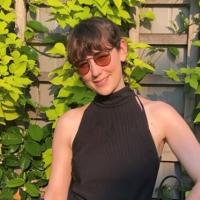Kousteni Lab
Principal Investigator

The Kousteni laboratory is affiliated with the Edward P. Evans Center for Myelodysplastic Syndromes at Columbia University, the Herbert Irving Comprehensive Cancer Center and the Columbia Stem Cell Initiative. Stavroula Kousteni is the Edward P. Evans Professor. of Physiology & Cellular Biophysics and Director of the Edward P. Evans Center for Myelodysplastic Syndromes at Columbia University.
Hematological myeloid malignancies such as myelodysplastic syndromes (MDS), myeloproliferative neoplasms (MPN) and acute myeloid leukemia (AML) arise mainly with aging. Traditional models ascribe this association and progression with aging to the slow process of acquiring mutations over time. Work from our group suggests that signals from the bone marrow stromal niche that promote expansion of hematopoietic stem cell (HSC) compartments impact myeloid disease progression by promoting clonal expansion of mutated (pre-leukemic) HSCs and emergence of MDS or AML. These two aspects, genetic drift and HSC extrinsic events, are typically studied separately.
The aim of our laboratory is to examine the role of the bone marrow microenvironment (or niche) in hematopoietic stem cell fate and function, in particular during the development of MDS and AML. We are interested in identifying the subpopulations in the bone marrow microenvironment and the mechanisms through which they interact with malignant cells to regulate disease progression. We are delineating molecular pathways that induce or select for genetic alterations in pre-malignant hematopoietic stem cells that transform them to malignant ones and the specific stem cell functions that they are affecting. We apply cutting edge genetic tools, and single cell technology to integrate studies of clonal mutational evolution and niche components in patients and mouse models, to establish the mechanisms through which the aging marrow supports the outgrowth of AML initiating clones.
The ultimate goal of our work is to identity therapies that target oncogenic signals stemming from the bone marrow microenvironment to prevent MDS and AML transformation and overcome targeted or standard of care therapy resistance.
Research Interests
Mapping niche-dependent and hematopoietic stem cell intrinsic mechanisms of MDS and AML evolution
The bone marrow stromal niche is a critical regulator of the development of hematological myeloid malignancies acting as a permissive niche required for their emergence or progression. Such permissiveness can be enhanced by alterations in the function or structure of different stromal cell compartments driven by aging or as a result of genetic alterations or disease and can lead to MPN, MDS or AML. Mutations in the stromal microenvironment can also contribute to the transformation of normal and pre-malignant hematopoietic stem cells. Examples of such oncogenic signals include deletion of retinoic acid receptor gamma or retinoblastoma protein in stromal cells, a gain-of-function mutation in β-catenin in osteoblasts, deletion of Dicer1 in osteoblast progenitors, a Noonan syndrome causative mutation in PTPN11, and mutations in the ribosome biogenesis SBDS gene causative of the Schwachman-Diamond bone marrow failure syndrome in stromal cells. Our laboratory integrates genomic, transcriptomic and epigenetic approaches to understand MDS and AML pathogenesis in the context of the stromal niche. We perform molecular profiling of hematopoietic stem cell populations implementing MDS development and clonal outgrowth in AML transformation and determine how their interactions with specific niche populations affect transformation.
Aging in the bone marrow in MDS and AML development
MDS and AML are clonal myeloid disorders characterized by impaired hematopoiesis resulting in cytopenia and in the case of AML excessive blast production. They present at all ages, but their incidence rates accelerate in the elderly, with a median age of diagnosis of ~70 years. MDS and AML can arise from a subset of already mutated pre-malignant hematopoietic stem cells that present in low frequency in otherwise healthy elderly individuals, a condition known as age-related clonal hematopoiesis (ARCH) . Interestingly, the most frequent of those mutations occur in genes encoding epigenetic regulators, such as DNMT3A, TET2 or ASXL1 which are also prevalent in MDS and AML. However, although such mutations occur frequently, they are only selected under specific conditions or require additional influences. Work from our group and others suggests that functional decline in aging blood-forming hematopoietic stem cells and signals from the aging niche that alter the transcriptional milieu or promote expansion of hematopoietic stem cell compartments have an impactful role in myeloid disease progression by promoting clonal expansion of mutated (pre-malignant) hematopoietic stem cells. We use genetic tools and single cell technology to integrate studies of clonal mutational evolution and niche components in patients and mouse models, to establish the mechanisms through which the aging marrow supports the outgrowth of MDS or AML initiating clones.
Tracing malignancy progression with novel molecules marking interactions between MDS or AML cells and stromal cells
Cells in the bone marrow microenvironment influence MDS, MPN and AML outcome and resistance to treatment. Conversely, malignant myeloid cells can remodel the niche to their advantage, our laboratory is interested in identifying such mechanisms of stroma remodeling in MDS and AML. In particular, we have identified a niche-dependent, cell non-autonomous progression model for MDS and AML, in which malignant cells seize peripheral serotonin signaling in osteoblasts to promote their growth. This line of research leads to identification of molecules that mediate such interactions and act as oncometabolites marking MDS and AML development and disease progression from MDS to AML in patients.
Therapeutic approaches targeting MDS and AML initiating or transformative signals triggered by bone marrow stroma cells
Despite decades of effort, MDS and AML remain largely recalcitrant to targeted therapy. Recent exome sequencing projects in MDS and AML have identified spectra of mutations. Thus far, few of those have been amenable to targeted therapies. Furthermore, targeted therapies have been limited by the evolution of malignant subclones containing resistant mutations, prompting a search for alternative targets that may be more stable. Recognizing these limitations, our laboratory focuses on the MDS and AML microenvironment in the bone marrow that enables or sustains dysplastic cells. We have shown that activation of ß-catenin/Jagged1 signaling in osteoblasts in mice leads to MDS and progresses to AML. This pathway may sustain dysplastic hematopoiesis and progression to AML in a subset of MDS patients. More recently, we showed that a niche-dependent axis (kynurenine-HTR1B-SAA-IDO1) promotes MDS and AML growth. The finding that hematological malignancies can arise from the interaction between a normal cell and its defective environment enhances the potential for drug therapy: the osteoblast, or another type of stromal cell, in MDS and AML may be more amenable to drug therapy than the malignant cells since it lacks the propensity to mutate and clonally expand.
Lab Members
Ioanna Mosialou, PhD
Ioanna Mosialou has been an Assistant Professor at CUMC since 2017. She received her MSc and PhD in Molecular Medicine from the Medical School of University of Crete, Greece, where she studied the mechanisms of transcriptional and post-transcriptional regulation of genes involved in HDL cholesterol metabolism and implicated in atherosclerosis and cardiovascular disease. Her prior work as a postdoc and associate research scientist at the Kousteni lab led to the identification of a new function of the skeleton in food intake regulation and b-cell function that is conserved in primates. Her current research aims to identify potential novel therapeutic approaches in MDS and AML by targeting the interactions between the malignant cells and the surrounding cells in the bone marrow microenvironment.
![]()
Marta Galán-Díez, PhD
Marta is an Associate Research Scientist in the Department of Physiology and Cellular Biophysics. She received her BSc in Biology and her PhD in Molecular Biology from Universidad Autónoma de Madrid, Spain. Her PhD research focused on the innate immune response to the opportunistic fungal pathogen Candida albicans. During her first postdoc at the Immunology & Microbiology Dept. in Columbia University, she focused her research on understanding how commensal microbiota modulate intestinal immune homeostasis. While a Molecular Biologist and Immunologist by training, she expanded her research interest towards hematology -particularly the bone marrow (BM) microenvironment- seeking innovative ways to treat hematological disorders. During her second postdoc at the Kousteni Lab, Marta studies how leukemic cells communicate with their neighboring “healthy” cells (stroma), and how this this interaction influences cancer progression. Her recent work has implications for the management of hematological malignancies in general, and MDS and leukemia in particular.

Álvaro Cuesta-Dominguez, PhD
Álvaro is an Associate Research Scientist in the Department of Physiology and Cellular Biophysics. He received his PhD in Biochemistry, Molecular Biology and Biomedicine from Universidad Autónoma de Madrid in Spain. During his first postdoc at Mount Sinai he studied human endogenous retroviruses (HERVs) in the context of HIV-1 infection. He joined the Kousteni lab in 2016, where he is really interested in understanding signals that emanate from the bone marrow niche and that influence the transformation of MDS to AML. To this end, he is using an integrated multi-omic approach that involves the use of mouse models, cell lines, human primary cells and publicly available databases.

Paraskevi Vgenopoulou, PhD
Paraskevi (Voula) is an Postdoctoral Research Scientist in the Department of Physiology and Cellular Biophysics. She received her Ph.D. from the National and Kapodistrian University of Athens in Greece in 2017. Her thesis unveiled the tumor suppressor role of Notch pathway in bladder cancer and elucidated its mechanism of action. She joined the Kousteni lab as a postdoctoral research scientist in 2017, applying the expertise she has gained in the generation and characterization of transgenic mouse models of cancer, cell signaling and functional validation of mutations in the dissection of the genetic, epigenetic and molecular landscape of a hematological malignancy and further expanding her research training. Specifically, she is exploring the crosstalk between the bone marrow niche and hematopoietic stem cells in the development and progression of acute myeloid leukemia and myelodysplastic syndromes in the context of IDH1 or IDH2 mutations with the aim to identify IDH-cooperating signals from the stroma that can be targeted in combination with current IDH1/2 inhibitors to improve treatment for a relevant subset of patients.

Brygida Bisikirska, PhD
Brygida is an Associate Research Scientist in the Department of Physiology and Cellular Biophysics. She received her MSc and PhD in biochemistry at the University of Wroclaw, Poland. Throughout her post-doctoral time, she was studying the mechanisms underlying pathological processes in human diseases, including autoimmunity and hematopoietic malignancies. At her current position in the Kousteni lab she is focused on bone related diseases. Particularly, she is interested in the characterization of precursor cells with osteogenic potential (COP) as markers of pathological processes related to bone, found in human peripheral blood, as well as identifying genetic events leading to development of rare bone diseases.

Rossella Labella, PhD
Rossella is a Postdoctoral Research Scientist in the Department of Physiology and Cellular Biophysics. She obtained her Ph.D. in the program of "Innovative technologies in skeleton, oro-craniofacial and skin diseases" at Sapienza University of Rome, Italy in 2018. Her work focused on the role of Gsα signaling pathways in the physiology of the human postnatal skeleton. Through her PhD projects, she developed a keen interest in the complex interaction between the different types of cells that reside in the bone and in the bone marrow microenvironment. Led by this interest, she joined Dr. Anjali Kusumbe’s Lab at Oxford University to study bone marrow stromal cells in development, homeostasis, and after irradiation and chemotherapy. She routinely performed several methodologies for bone marrow analysis in mice, such as flow cytometry, histology, confocal and light sheet microscopy, mouse irradiation, and bone marrow transplantation. She joined the Kousteni lab in January 2020 and she is currently studying the role of the mesenchymal stromal cells in MDS to AML transformation.

Jessica DeAngelis, PhD
Jessica received her BSc and PhD in developmental biology at the University of Queensland, Australia. During her PhD she studied the utilized forward genetic screening to uncover new regulators of cardiovascular development using Zebrafish. Following this work, she moved to the Kennedy Institute of Rheumatology where she studied the changes in the vascular landscape during aging of various organs in mice. In the Kousteni lab, Jessica is studying the role of osteoblast derived hormones in the regulation of the acute immune response.

Select Publications
Kode A., Manavalan S.J, Mosialou I., Bhagat G., Rathinam C.V, Luo N., Khiabanian F., Lee A., Vundavalli M., Friedman R., Brum A., Park D., Galili N., Mukherjee S., Teruya-Feldstein J., Raza A., Rabadan R., Berman E. and Kousteni S. Leukemogenesis Induced by an Activating β-catenin mutation in Osteoblasts. Nature, 506:240-244, 2014.
Krevvata M., Silva B.C., Manavalan J.S., Galan-Diez M., Kode A., Matthews G.B., Park D., Zhang C.A. Galili N., Nickolas T.L., Dempster D.W., Dougall W., Teruya-Feldstein J., Economides A.N. Kalajzic I., Raza A., Berman E., Mukherjee S., Bhagat G., and Kousteni S. Inhibition of Leukemia Cell Engraftment and Disease Progression in Mice by Osteoblasts. Blood, 124: 2834-2846, 2014.
Kode A., Mosialou I., Manavalan J.S., Friedman R.A., Teruya-Feldstein J., Bhagat G., Berman E. and Kousteni S. FoxO1-Dependent Induction of Acute Myeloid Leukemia by Osteoblasts in Mice. Leukemia, 30:1-13, 2016.
Manavalan J.S., Arpadi S., Tharmarajah S., Shah J., Zhang C.A., Foca M., Neu N., Bell D.L., Nishiyama K.K., Kousteni S., Yin M.T. Abnormal Bone Acquisition With Early-Life HIV Infection: Role of Immune Activation and Senescent Osteogenic Precursors. Journal of Bone and Mineral Research, 31:1988-1996, 2016.
Galán-Díez M., Isa A., Ponzetti M., Nielsen M.F., Kassem M. and Kousteni S. Normal hematopoiesis and lack of β-catenin activation in osteoblasts of patients and mice harboring Lrp5 gain-of-function mutations. Biochimica et Biophysica Acta, 1863:490-498, 2016.
Tikhonova A.N., Dolgalev I., Hu H., Sivaraj K.K., Hoxha E., Cuesta-Domínguez A., Pinho S., Akhmetzyanova I., Gao J., Witkowski M., Guillamot M.R, Gutkin M.C., Zhang Y., Marier C., Diefenbach C., Kousteni S., Heguy A., Fooksman D.R., Butler J.M., Economides A., Frenette P.S., Adams R.H., Satija R., Tsirigos A., and Aifantis I. Transcriptomic profiling of the bone marrow microenvironment at single cell resolution. Nature, 569:222-228, 2019.
Galán-Díez M., Borot F., Ali A. M., Zhao J., Liu Y., Huang X., Gil-Iturbe E., Kurland I., Quick M., Roth B. L., Mukherjee S., Rabadán R., Raza A., Kousteni S. Subversion of serotonin-receptor signaling in osteoblasts by kynurenine drives Acute Myeloid Leukemia. Cancer Discovery, DOI: 10.1158/2159-8290.CD-21-0692, 2022







